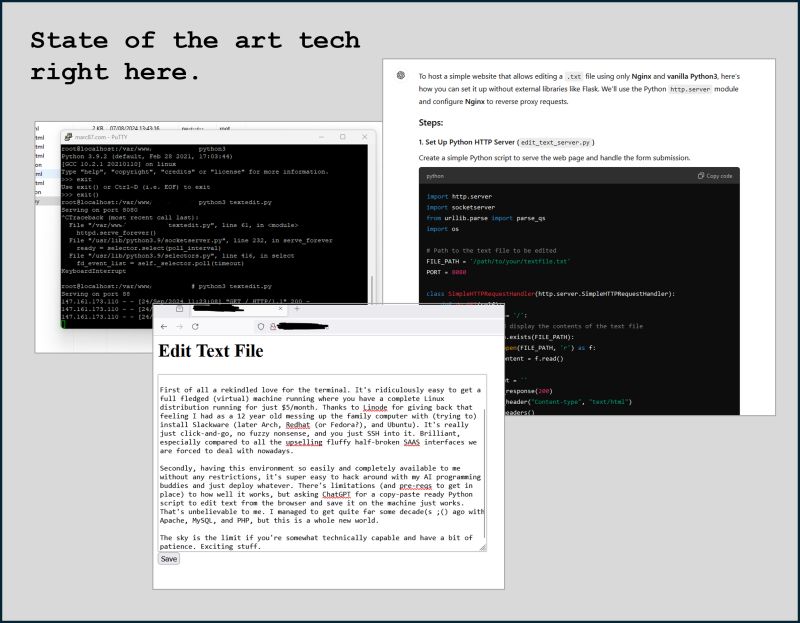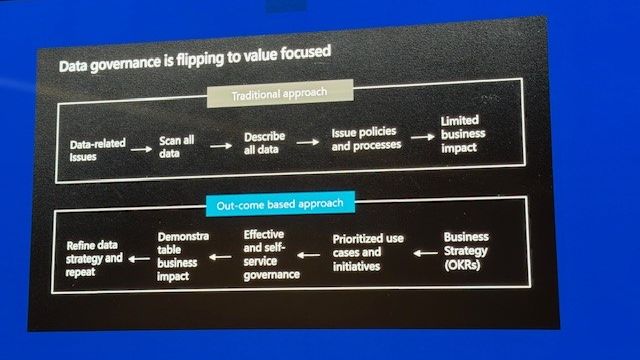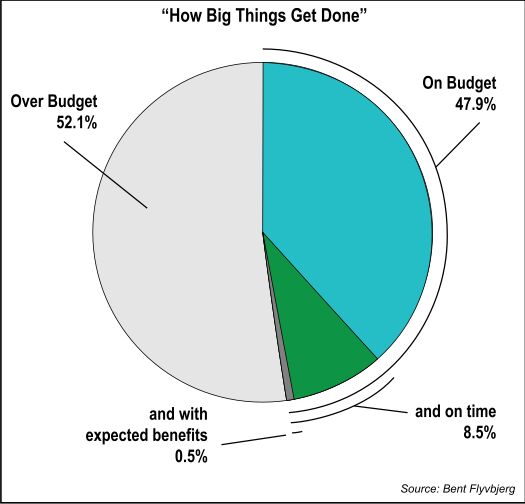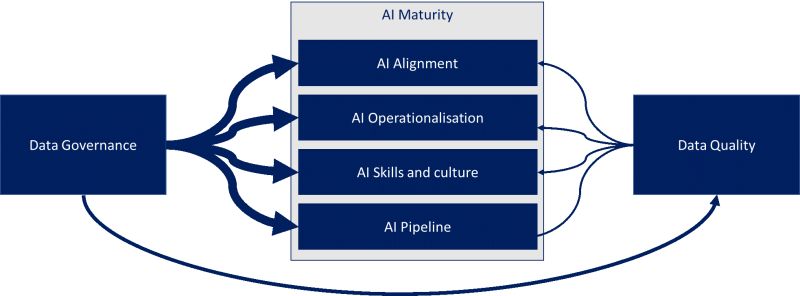Blog Posts
Published on: October 17, 2024
🏢 I left the comfort of the corporate cradle and started as a freelancer about a year ago; half a year later, I pulled the plug and am back. I loved freelancing, but sometimes there are offers you can't refuse, and I'm happy where I am again. I still want to share some thoughts on what I loved about the freelance experience.
💡 Surprisingly it is actually running your own business, even as a one-man-shop. Because I was a tech freelancer I didn't have any stock, or employees (outside of myself), but all of the other bells and whistles were there. I needed to set up my accounting, set up my legal incorporation, set up a whole bunch of tax stuff, figure out what I was going to sell myself as, find someone to pay me for services, get a simple website in the air, arrange a bunch of other legal / insurance stuff and ready to go.
Having been cuddled by good employers in the cozy world of corporate for the ten years prior I never needed to consider a lot of the above. I just showed up, did the 9-5, delivered some value (as they say), and got paid. Easy-peasy. But with the above, more personal responsibility was needed, and I really *really* enjoyed that. It was like moving from high school where your schedule tells you where to go and what to do, to university, where nobody tells you anything and you have to figure it out.
It also showed me what I liked doing: I enjoyed figuring out the accounting and tax situation. It's straightforward over here in the Netherlands however, there are still a couple of dozen specific rules, regulations, and exemptions you want to consider, especially if you don't want any surprises on your tax bill. But I was very annoyed with how impossible it is to get decent health-related unemployment insurance (AOV) with any existing conditions, a great way to discourage entrepreneurship.
🌱 It was also amazing to have the freedom to daydream about growing a bigger business, and not feeling constrained by internal career paths. This liberation already started when I left a corporate job for the first time, but reached its fulcrum this time around. There were some downsides as well of course, but that's for a different time ;-)
Feel free in touch with me if you're considering a change, either in one direction or another. Always happy to reflect.
Published on: October 03, 2024
I'm a nerd at heart, despite the MBA and history degree, I'll still go for the blinking cursor in a B/W terminal over a library. And two things really excited me on the technology front lately. And they go hand in hand, so I'm keen to share.
First of all a rekindled love for the terminal. It's ridiculously easy to get a full fledged (virtual) machine running where you have a complete Linux distribution running for just $5/month. Thanks to Linode for giving back that feeling I had as a 12 year old messing up the family computer with (trying to) install Slackware (later Arch, Redhat (or Fedora?), and Ubuntu). It's really just click-and-go, no fuzzy nonsense, and you just SSH into it. Brilliant, especially compared to all the upselling fluffy half-broken SAAS interfaces we are forced to deal with nowadays.
Secondly, having this environment so easily and completely available to me without any restrictions, it's super easy to hack around with my AI programming buddies and just deploy whatever. There's limitations (and pre-reqs to get in place) to how well it works, but asking ChatGPT for a copy-paste ready Python script to edit text from the browser and save it on the machine just works. That's unbelievable to me. I managed to get quite far some decade(s ;() ago with Apache, MySQL, and PHP, but this is a whole new world.
The sky is the limit if you're somewhat technically capable and have a bit of patience. Exciting stuff.

Published on: October 02, 2024
🚀 Key takeaways from Collibra Customer Connect -- Amsterdam Edition!
So much to take in after last week's Collibra Customer Connect! With four other key Collibra clients, Ikea, LEGO, ASML, and HEINEKEN we were kindly hosted by The HEINEKEN Company and shared some of our challenges and gains from using Collibra over the years.
First of all it was great to be back on the old green nest, even after some massive renovations and office refurbishments it was clearly still the HEINEKEN office I knew for 9 years. The Heineken Experience tour drove that home even more, and it was great to get the VIP tour (thx Emma ;-)) because that one I didn't have yet.
On the content side it was great to get some peeks into each others' kitchen. Because we all know how shiny the world looks on slides of suppliers and even shinier on the slides of consultants, there's little that beats talking with people face the same stuff you do in their organisation.
Some particular insights which I liked:
🗝️ Introduce key leverage to drive adoptions. E.g. for Data Catalogs make it the *only* place to get authorisation to access certain data sets. E.g. for Data Products, make it mandatory for any AI initiative to *only* use data provided as part of a Data Product. It might not deliver the short-term your consumers might want, but it will force adoption of technology which will deliver more value over the long run (i.e. the whole data management proposition).
🤖 Of course a lot going on in the space of AI governance, and governance being aided by (Gen)AI. Interesting to see the discussion oscillate between treating AI as just another use case, and AI changing the world every other day... though it seems for data people AI changes seem to be less spectacular than generally described.
🧱 A complete separation in the UX between the Data Marketplace offerings and the Data Governance back-end. It drives less people to the hardcore side of your data team's deliverables, but it does make it a lot easier for the entire company to actually find what they need. An interesting trade-off to consider.
But above all an amazing opportunity to connect and get inspiration from likeminded people doing cool s...tuff, also a great reminder about the richness of coming together physically as opposed to Zooming. 🎉 Thanks @Milan for organizing, and @Emma for hosting!
And how are you driving adoption of Data Catalogs in your organisation? Is AI the golden solution? Does it even help?

Published on: October 01, 2024
Last week, I was lucky enough to attend two insightful mini-conferences. The first event was a small get together at Microsoft for the Data Governance Executive Forum. A couple of big takeaways from there:
🔥 𝗗𝗮𝘁𝗮 𝗚𝗼𝘃𝗲𝗿𝗻𝗮𝗻𝗰𝗲 𝗱𝗿𝗶𝘃𝗲𝘀 𝘃𝗮𝗹𝘂𝗲
• Data governance is more important than ever, and we should focus on value add versus risk and control.
• "Customer Zero" a concept not just related to DG, but a concept where you practice what you preach, drink your own champagne, et cetera, you should be the first (sorry, zeroth) customer of your own data solutions and principles -- e.g. make your own data governance metrics / data your first data product.
📚 𝗗𝗮𝘁𝗮 𝗣𝗿𝗼𝗱𝘂𝗰𝘁𝘀 𝗮𝗻𝗱 𝗖𝗮𝘁𝗮𝗹𝗼𝗴𝘀
• Data Products are not a new paradigm, but they are coming to life, and are starting to make an impact on business -- the exact form is still very fluid, but it's congealing around some key concepts.
• Data catalogs are growing as a topic, and as a potential driver for unlocking value pockets in the enterprise, at the same time also data catalogs as a concept themselves are changing, super interesting space to be in with a ton of untapped potential.
🤖 𝗗𝗮𝘁𝗮 𝗤𝘂𝗮𝗹𝗶𝘁𝘆 𝗮𝗻𝗱 𝗔𝗜
• Good Data Quality is a pre-requisite for meaningful (Gen)AI in the enterprise -- a topic which is very alive in the data governance community, and I think it will break out of our small group very soon.
• Bad data quality / management / governance will lead to a very expensive mess if you throw AI into that mix.
Big thanks to Microsoft's Amandine De Veyt for the invite, but also to BCG's Sander van Loosbroek, Nutreco's Patrick van Kalken, and Microsoft's Delphine Clement for showing their Data Governance visions.

Published on: September 13, 2024
Anybody else get a bit tired of all these ChatGPT generated LinkedIn posts? Yeah me too. 🛑
I do get it, there's some ease in just tossing some keywords towards a bot and a pretty emoji filled post comes out -- even LinkedIn themselves are promoting this type of behaviour with the inbuild AI features. But it's not great to read. Wouldn't it be nicer to read posts written by actual humans? It's still possible to get a bit of help by modern technology, but keep the core to yourself.
💯 That's why for myself I made a small balanced scorecard prompt, which just reminds me what I'm actually trying to do with these LinkedIn posts. But, very important, it doesn't actually write anything for me. It will give some proposals, but in the end very word is written by myself (usually in notepad.exe, because nothing beats that for simplicity).
I went through a ton of "How to write engaging content for LinkedIn" etc etc etc type of posts, so you don't have to. Based on those articles, and my own good sense of sensibility I made a balanced scorecard prompt, which is easy to use, and gives you useful feedback. Check it out:
----
Hi, I'm trying to write engaging LinkedIn content which will get a lot of views, and preferably some engagement (i.e. likes or comments) as well.
This is my LinkedIn profile text:
""
➡️ *Insert your description here* ⬅️
""
With this as my latest work and educational experience:
""
➡️ *Insert your last work experience as line items* ⬅️
""
Take this as input for a scorecard for the content:
""
1) Engaging Title - e.g. statistics; inspirational/motivational quote; thought provoking; how-to ...; humor; intriguing statement; attentation grabber.
2) Relation to self
3) Tangible tips / takeaway for reader / intellectual property
4) End with call to action / instruction / question
5) Have some flair with emojis
6) Avoid long blocks of text
7) Tag people as part of the story (not too many, and only if relevant)
Optional) Evaluate against a (i) hook (ii) re-hook (iii) Body (iv) End-of-body with personal/engaging/persuasive (v) Call to action) framework with content spread 10%-10%-60%-10%-10%.
""
In the next statement I will give the content of the text. Assume that there is a relevant visual attached to the post as well. Fill in the scorecard, if there is a high variance change you might propose for that portion of the scorecard please give it.
----
PS this post scored a 7/10, but I'm confident I know better than the bot still ;-) Let me know if it works for you, and how you keep yourself in the posts without turning yourself into a chatbot interface.

Published on: September 10, 2024
I just finished reading How Big Things Get Done by Dan Gardner and Bent Flyvbjerg. The lessons are not just for massive projects like nuclear reactors or space stations. IT projects are some of the most notoriously over-budget and late-delivered projects, so there's something there for the data corner of the world as well—and yes, data projects are not IT by default, but in practice, data will be grouped there.
"TAKE THE OUTSIDE VIEW. Your project is special, but unless you are doing what has literally never been done before—building a time machine, engineering a black hole—it is not unique; it is part of a larger class of projects."
Definitely true in Data Governance as well. There is always the argument that this particular business or business unit is unique: "we're different, we can't follow the normal process." It turns out that when you keep asking a couple of questions, most units are actually not that different. They all have some inputs, some processing, and some outputs, during which some data is generated, modified, and used. This can be governed; just find the right level of abstraction.
"ASK “WHY?” Asking why you’re doing your project will focus you on what matters—your ultimate purpose and result. This goes into the box on the right of your project chart. As the project sails into a storm of events and details, good leaders never lose sight of the ultimate result."
Always be able to explain what you're doing when talking to your stakeholders. This needs to be in your team's DNA. "Because it's the process" really isn’t the right answer 99% of the time. People generally want to cooperate, but they often (and in some cultures, always...) want to know why they are doing something. Getting to a state where you're actually able to explain yourself also forces you to nail down what you're really trying to achieve. If your target is unclear, so will be your explanation, and this will make you fail.
"BUILD WITH LEGO. Big is best built from small. Bake one small cake. Bake another. And another. Then stack them. Decoration aside, that’s all there really is to even the most towering wedding cake. As with wedding cakes, so with solar and wind farms, server farms, batteries, container shipping, pipelines, roads."
Loved this one, and not only because of the LEGO. It's so easy to lose yourself in magnificent vistas of achieving world peace through your new data governance policy, but you might just want to get started with a conversation with a disgruntled administrator who has a poor experience trying to get some data fixed.
There's a bunch more in this book, and so much of it is applicable to IT projects (one of the project types with the worst track record) and corporate projects in general that it's really worth the read. Agile lost its buzz a bit lately, but this book should be mandatory reading for anyone in an agile-related role.

Published on: September 02, 2024
Data Governance is more important for AI than Data Quality! This was the surprising conclusion -- for me at least -- from my MBA Thesis [https://lnkd.in/ed5wdz76] research on organisational readiness for AI. It's been almost 3 years now, and at the time of writing AI was mainly ML, Data Science, and advanced linear regressions -- LLM's existed, but more as science fair material. Obviously this all changed with the launch of ChatGPT, and everything is (Gen)AI and everybody is an AI expert nowadays, however the conclusion still stands.
The conclusion surprised me because for most of my career Data Quality was king, and Data Governance was often an afterthought, it was helpful, but not critical. And during programmes and projects it was often allocated a small slice compared to the enormous chunks of effort which went into getting Data Quality up to a workable level.
Does this mean you need to invest more in your Data Governance? Yes, but that was true anyway ;-) Does this mean you need to take those resources from Data Quality? No, you do definitely need Data Quality as well. Do you need to weigh the investment and required deliverables for Data Governance more heavily when you look at AI initiatives compared to looking at regular processes embeddings? Yes, definitely.
And why does Data Governance matter more than Data Quality? In a similar same way that discussions around technology move more towards organisational readiness, culture changes, upskilling, and employee acceptance. It's great if your data is high quality, but data governance will enable you to actually find it, and get you access to it, it will make your users capable and literate towards data, so they can actually use it for their AI usage.
And a nice bonus is that improved Data Governance also increases Data Quality 🎉

Published on: September 01, 2024
Although I've been a full time data guy for over a decade now, I do like to keep in touch with other parts of the business. Particularly finance, and the world of finance, have always been interesting. It might be from being born in the same year as Wallstreet premiered, or just growing up in the booming 90s where stocks were only going up to such an extent that it was regularly mentioned on the children's daily newscast.
Keeping one toe in the water I loved reading Michael Lewis's work like Liar's Poker, The Big Short, and of course Flash Boys, my favourite -- because it combines so completely the worlds of hard technology and finance. To keep updated on the more current state of affairs, and still gaining some background insight, I've been very happily subscribed to Matt Levine's Money Stuff newsletter for a couple of years now.
Since a couple of months I've been following Secret CFO who in his weekly newsletter deep dives on topics close to a CFO's heart, like "M***** F**** Cashflow", "From People to Profit: Using KPIs to Drive Performance", "🎨 Mastering the Art of Corporate Budgeting: A Step-by-Step Guide" -- and what it actually means for a business.
Together with actually setting up my own business last year this newsletter has offered the most practical insight into how an actual business is actually run from a finance point of view -- moreso than my MBA finance courses did. The subject matter might seem a little dry if you're not a finance person, but he manages to keep it interesting through anecdotes and relating it to actual business impact.
(Illustration DALL-E; text all mine)







